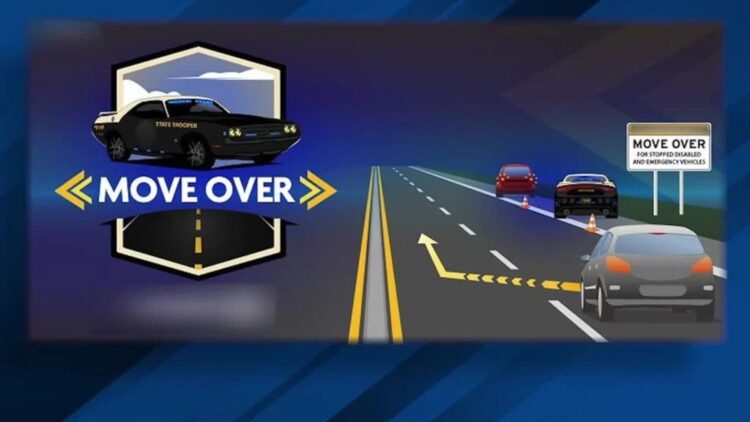World
Nebraska Increases Speeding Fines and Expands Move Over Law

Nebraska has made significant changes to its traffic laws aimed at enhancing road safety. Starting from September 3, 2025, the state has quadrupled speeding fines and expanded the existing Move Over Law to include all vehicles stopped on the roadside. This initiative, spearheaded by the Nebraska Department of Transportation, comes in response to a notable increase in speeding violations.
Details of the New Legislation
The revised Move Over Law, now under Legislative Bill 530, mandates that drivers must reduce their speed and change lanes when approaching any vehicle that is stopped on the side of the road. Previously, this law applied only to emergency and roadside assistance vehicles. The updated regulations encompass all stopped vehicles, including those involving vulnerable users such as pedestrians and cyclists. This applies to all highways, including Interstate 80.
According to Vicki Kramer, the director of the Nebraska Department of Transportation, the primary objective of this reform is to improve safety on Nebraska’s roads. The state is also implementing new signage to inform drivers of these changes, emphasizing the importance of compliance.
Increased Penalties and Structural Changes
Alongside the expanded Move Over Law, the penalties for speeding have seen a substantial increase. The new fine structure is as follows:
- 1–5 mph over the limit: $50 (up from $10)
- 6–10 mph over: $75 (up from $25)
- 11–15 mph over: $125 (up from $75)
- 16–20 mph over: $200 (up from $125)
- 21–35 mph over: $300 (up from $200)
- 36+ mph over: $400 (up from $300)
This marks the first significant update to Nebraska’s traffic regulations in nearly three decades. The last major change occurred in 1996, highlighting the urgency of this legislative update due to rising speeding violations. The increase in fines is intended to deter reckless driving and address the growing concern for safety on the roads.
Additionally, the term “reckless driving” has been formally introduced into the law. This classification applies to individuals whose dangerous driving leads to severe consequences, such as vehicular homicide, which is categorized as a Class IV crime.
As part of this legislative overhaul, the Nebraska Department of Transportation will also have the authority to temporarily reduce speed limits in adverse weather conditions and implement variable speed zones to better protect drivers and road users.
Impact and Response from Other States
The recent changes in Nebraska reflect a broader trend among states responding to traffic safety concerns. For instance, Indiana has increased its speed limit on certain roads, while Minnesota has established dedicated lanes for cyclists to minimize accident risks. Similarly, Maryland has intensified penalties for speeding, including potential jail time.
As Nebraska embarks on this journey to enhance road safety, authorities stress that compliance from drivers is crucial. The reforms are not merely punitive but aim to foster a culture of responsibility on the roads. With these measures in place, Nebraska hopes to reduce the number of traffic violations and improve safety for all road users.
-

 Lifestyle3 months ago
Lifestyle3 months agoLibraries Challenge Rising E-Book Costs Amid Growing Demand
-

 Sports3 months ago
Sports3 months agoTyreek Hill Responds to Tua Tagovailoa’s Comments on Team Dynamics
-

 Sports3 months ago
Sports3 months agoLiverpool Secures Agreement to Sign Young Striker Will Wright
-

 Lifestyle3 months ago
Lifestyle3 months agoSave Your Split Tomatoes: Expert Tips for Gardeners
-

 Lifestyle3 months ago
Lifestyle3 months agoPrincess Beatrice’s Daughter Athena Joins Siblings at London Parade
-

 World3 months ago
World3 months agoWinter Storms Lash New South Wales with Snow, Flood Risks
-

 Science3 months ago
Science3 months agoTrump Administration Moves to Repeal Key Climate Regulation
-

 Science2 months ago
Science2 months agoSan Francisco Hosts Unique Contest to Identify “Performative Males”
-

 Business3 months ago
Business3 months agoSoFi Technologies Shares Slip 2% Following Insider Stock Sale
-

 Science3 months ago
Science3 months agoNew Tool Reveals Link Between Horse Coat Condition and Parasites
-

 Sports3 months ago
Sports3 months agoElon Musk Sculpture Travels From Utah to Yosemite National Park
-

 Science3 months ago
Science3 months agoNew Study Confirms Humans Transported Stonehenge Bluestones









